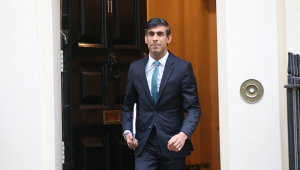Jamie Jamieson, chairman of the Local Government Association, called for the local government funding gap – which the LGA calculates as £5bn next year, rising to £8bn by 2025 – to be addressed.
The government will announce the departmental budgets for 2020-21 in September, although a Treasury spokesperson told PF that there was still “no set date”.
Jamieson said: “Councils urgently need some certainty about how local services will be funded next year as they begin their budget-setting process, so we are pleased that the announced spending round will be completed in September.
“The spending round needs to make securing the sustainability of local services the top priority.”
David Williams, leader of Hertfordshire County Council and chairman-elect of the County Councils Network, said the “entire” local government sector needed to support ministers in “making the case for additional funding for councils next year”.
He called for an “emergency injection of resources” to help close county authorities’ funding black hole of “£2.1bn next year”. “It is imperative that any new resources are distributed fairly,” he added.
Williams also said it was “extremely disappointing” that this announcement made it seem unlikely the fair funding review will be introduced next year. The CCN will be “seeking a cast iron commitment” that it will be published this year, to be implemented in 2021-22.
Chief executive of CIPFA Rob Whiteman said the review was too short to provide the certainty required for good financial planning and management, and urged the chancellor to “reframe his thinking” to “alleviate the fiscal pressures faced by the sector”.
He said: “Long-term clarity and transparency is vital to ensure financial plans at all levels of government are accurate, efficient and sustainable.”
Martin Swales, president of Solace, the representative body for senior public sector staff in the UK, said the organisation had been encouraging the government to give local government financial certainty “sooner rather than later”, and called the ‘Spending Review’ a “pragmatic outcome”.
“We look forward to understanding the detailed proposals,” he said. He added: “Through MHCLG we look forward to further constructive dialogue with the Treasury on creating a sustainable financial framework for the medium to long-term future of our sector.”
Usually Spending Reviews cover three years, but Javid said this one-year round will “clear the ground” for government departments to focus on Brexit. It has fuelled suspicion the government is preparing for a general election, likely to be in November – after the Brexit date of 31 October. The full Spending Review should now take place next year.
Shadow chancellor John McDonnell said the decision to fast-track the spending review “smacks of pre-election panic”.
He called the announcement a “publicity stunt”, warning that a one-year Spending Review meant next year the government could “turn off the taps of any additional spending” and it kept “the door open for even more austerity if a no deal Brexit breaks the economy”.
The IFS suggested that Spending Review could mean the end of austerity for 2020-21.
The #SpendingReview announced for September is likely to herald the end of austerity for public services – at least for next year.
— IFS (@TheIFS) August 9, 2019
But the outlook – both for the economy and for public spending – remains highly uncertain.
IFS analysis: https://t.co/Ji1sTab5iG pic.twitter.com/eKuYBQRACz
Chief secretary to the treasury Rishi Sunak announced last night the government plans to invest in schools and policing, and deliver on recent promises about the NHS, defence and international aid.
Office for National Statistics data released today showed the UK economy fell by 0.2% between April to June this year - for the first time since the fourth quarter of 2012 (when it also dropped by 0.2%).
A downturn in the production sector was the greatest contributor to the drop in growth, contracting by 1.4% in the second quarter of this year, the ONS said. The stats showed UK growth went up in 0.5% in the first quarter.
The ONS suggested: “There is evidence that stockpiling was taking place in the first quarter of the year, which provided a boost to GDP, with the latest figures showing that these increased stock levels were partly run down in Quarter 2 2019”.
Local Government Information Unit chief executive Jonathan Carr-West wrote for PF yesterday on the consequences a no deal Brexit could have for the local government.
Institute for Fiscal Studies director Paul Johnson told PF last week an October emergency budget would be an “extraordinarily bad idea”.
UPDATE at 2.45 pm on 9/8/19:
The story has been updated with a quote from CIPFA's chief executive Rob Whiteman since it was originally written.











